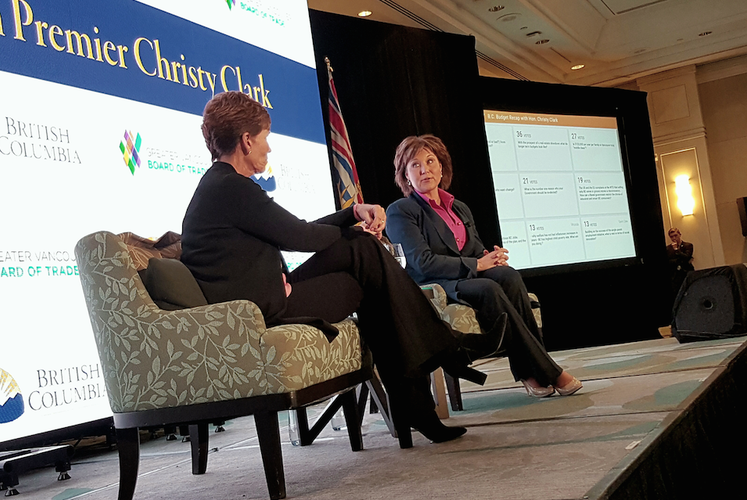B.C. Premier Christy Clark touted her government’s strong record of job creation in a Feb. 22 speech to the Greater Vancouver Board of Trade (GVBOT) and vowed to make job creation a central issue in the election campaign that is essentially already underway as the May 9 election looms.
She also made some surprising statements during a question and answer session with LifeLabs CEO Sue Paish. For example, she took a veiled jab at former U.S. presidential candidate Hillary Clinton’s campaign strategy and was uncharacteristically blunt about Medical Services Plan (MSP) premiums, suggesting that they are essentially a tax that generate proceeds for government to funnel into “one big pot of money.”
MSP premiums were one of the touch points in the speech because Finance Minister Mike de Jong, on Feb. 21, announced plans to chop them in half starting next year for all households that have annual incomes that are $120,000 or less.
“Everybody in the room knows that MSP premiums don’t go to pay for healthcare, right? Anything more than school taxes go to pay for education or your income taxes go to pay for roads,” Clark said. “It all ends up in one big pot of money and we just happened to give it that name.”
In past years, Clark’s government has trumpeted the province’s comparatively low income tax rate among provinces and tried to make clear that MSP premiums were something separate – a separate source of revenue that brings in more than $2.3 billion annually.
But it was the issue of jobs that Clark kept returning to as a point of focus.
Her assessment of the U.S. presidential election was that Donald Trump won because “you had one candidate talking about growth and jobs and the economy and you had one candidate who was not.”
In the current B.C. election campaign, she made it clear that she is the one speaking about those things.
Her argument that she is better able than New Democratic Party (NDP) leader John Horgan to create jobs is rooted in what she called a strong foundation that includes the province’s fifth consecutive balanced budget and the only Triple A credit rating among provinces.
Were the province to have Ontario’s lower A+ credit rating, Clark said, B.C. would have to pay an additional $2.23 billion every year in interest on the province’s debt.
“I believe that a job is the single most important life-changing thing that can happen for most people because if you don’t have a job, you don’t have the ability to look after the people who you love and many times not even the ability to look after yourself in the way that you deserve,” Clark said.
“Jobs matter for people, and we need to make sure that those jobs are out there in the economy.”
She said she understands that people often want a change in government but warned about the risk of what she said would be going “backwards,” particularly at a time when protectionism is gaining popularity worldwide.
“We are surrounded in the world by a rising tide of protectionism,” she said.
“It started with Brexit. The softwood agreement [expiring], the collapse of the TPP (Trans Pacific Partnership) and for the very first time in a generation, we face real uncertainty about the future of NAFTA (North American Free Trade Agreement).”
To try to combat U.S. protectionist sentiment and strike a new softwood lumber agreement, Clark said that she will send former Canfor CEO and former Canadian International Trade Minister David Emerson to Washington.
“We’re renting a desk down in the [Canadian] embassy in Washington, D.C. He’ll be working very closely with the ambassador David MacNaughton so I think he will be a big part of making sure that we tell our story. We are going to be advertising in the American heartland,” she said.
“The American economy will pick up when residential housing picks up. And residential housing will pick up in the U.S. when they have an adequate supply of low-cost materials to build that housing and they can’t do it without Canadian softwood.”
The B.C. Liberal Party leader’s visit to the GVBOT was part of the board’s series of speeches from leaders of all of B.C.’s major political parties. The NDP’s Horgan spoke February 10 while Green Party leader Andrew Weaver spoke February 3.
For business news go to biv.com



